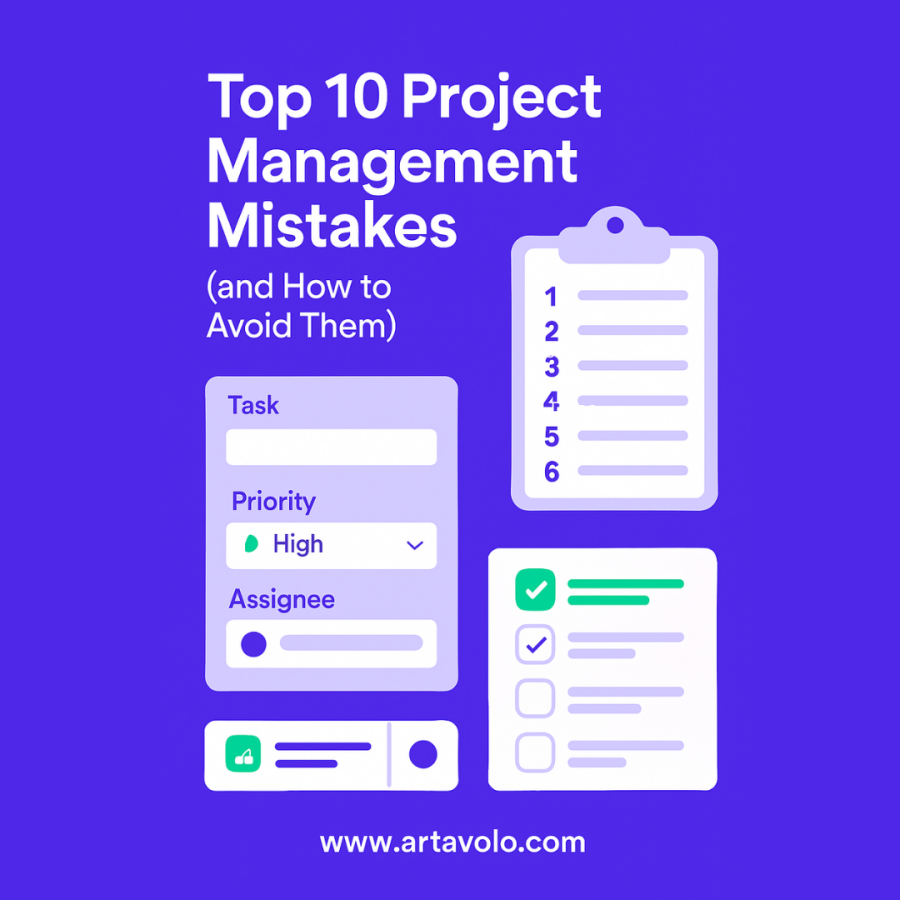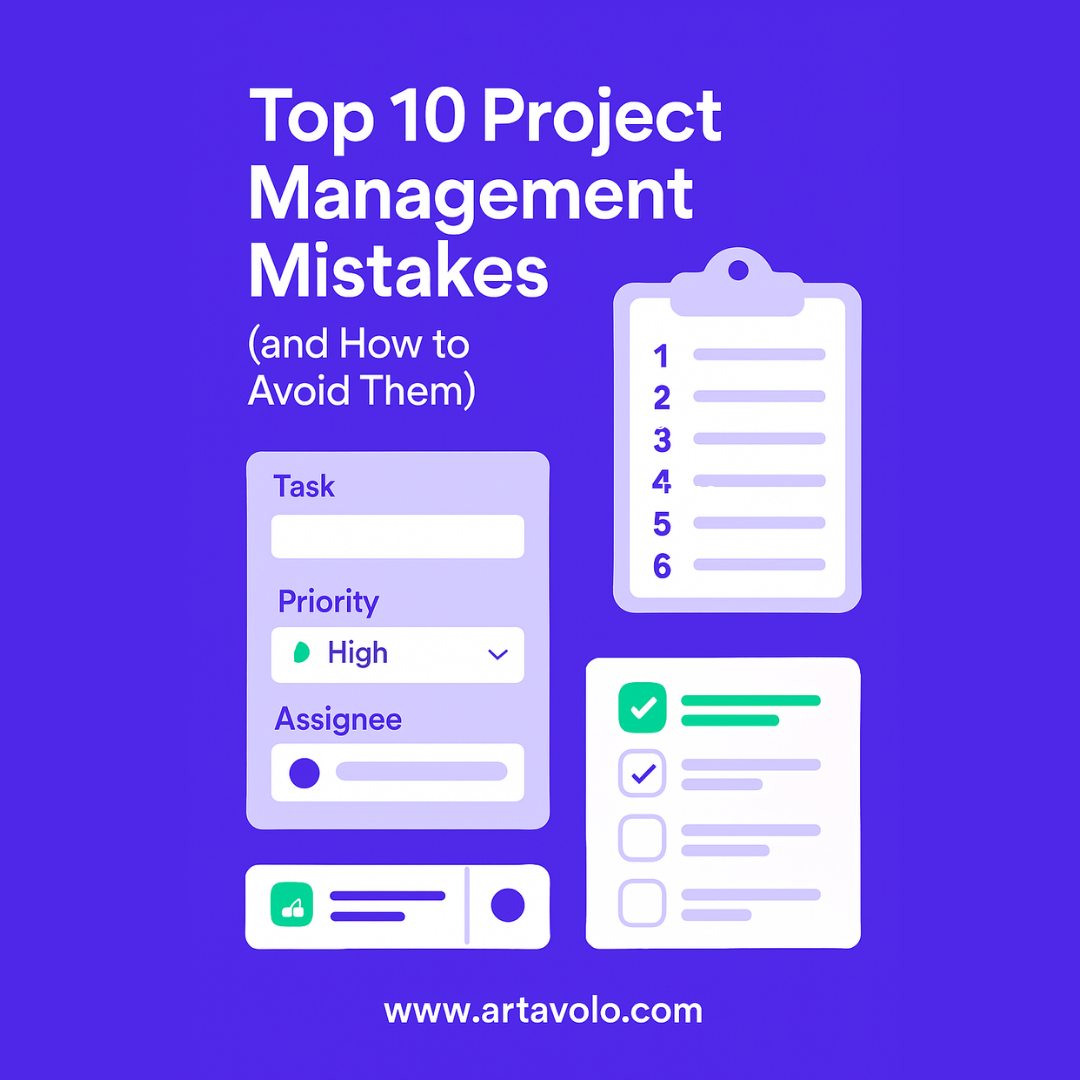Effective project management is crucial for delivering outcomes on time and within budget. However, many projects encounter pitfalls that can derail success. Below, we explore ten common project management mistakes and strategies to avoid them, supported by credible sources.
1. Unclear Goals and Objectives
Projects lacking clear objectives often suffer from misaligned teams and unmet expectations.
How to avoid it:
Define SMART (Specific, Measurable, Achievable, Relevant, Time-bound) goals.
Ensure all stakeholders understand and agree on project objectives.
Utilize tools like Artavolo to document and track objectives.
Reference: PMI's Pulse of the Profession® 2021 report highlights the importance of clear objectives in successful project outcomes. Project Management Institute+1Project Management Institute+1
2. Poor Communication
Ineffective communication can lead to misunderstandings and project delays.
How to avoid it:
Establish clear communication channels and protocols.
Regularly update stakeholders on project progress.
Use collaborative platforms to centralize communication.
Reference: Project.co's Communication Statistics 2025 report emphasizes the critical role of effective communication in project success. Wellingtone+3project.co+3project.co+3
3. Scope Creep
Uncontrolled changes in project scope can lead to resource strain and missed deadlines.
How to avoid it:
Clearly define project scope from the outset.
Implement a formal change management process.
Regularly review and manage scope changes.
Reference: Wellingtone's State of Project Management Report 2025 discusses the prevalence and impact of scope creep in projects. Wellingtone
4. Unrealistic Deadlines
Setting unattainable deadlines can compromise quality and team morale.
How to avoid it:
Base timelines on data from similar past projects.
Involve team members in the scheduling process.
Incorporate buffer time for unforeseen challenges.
Reference: McKinsey's analysis reveals that large IT projects often exceed budgets and timelines, underscoring the need for realistic planning.
5. Lack of Ownership and Accountability
Ambiguity in roles can lead to tasks falling through the cracks.Gallup.com+1Project Management Institute+1
How to avoid it:
Assign clear responsibilities for each task.
Use project management tools to track accountability.
Foster a culture of ownership within the team.
Reference: Gallup's research indicates that clarity in expectations enhances employee engagement and performance. Gallup.com
6. Ignoring Risk Management
Overlooking potential risks can result in unpreparedness for challenges.
How to avoid it:
Conduct thorough risk assessments during planning.
Develop contingency plans for identified risks.
Monitor and adjust risk strategies throughout the project.
Reference: PMI's Pulse of the Profession® 2016 report emphasizes the importance of proactive risk management in project success. Project Management Institute
7. Using Disconnected Tools
Relying on multiple unintegrated tools can hinder collaboration and efficiency.
How to avoid it:
Adopt integrated project management solutions.
Ensure tools facilitate seamless communication and data sharing.
Regularly assess tool effectiveness and team satisfaction.
Reference: Asana's Anatomy of Work Index 2022 highlights how fragmented tools can impede organizational agility. resources.asana.com+2Asana+2resources.asana.com+2
8. Skipping Post-Project Reviews
Neglecting to analyze completed projects can lead to repeated mistakes.
How to avoid it:
Conduct comprehensive post-mortem analyses.
Document lessons learned and best practices.
Apply insights to future projects for continuous improvement.
Reference: Harvard Business School research demonstrates that reflection enhances job performance and learning. Harvard Business School Library+1Harvard Business School+1
9. Micromanagement
Excessive oversight can stifle creativity and reduce team morale.
How to avoid it:
Empower team members with autonomy in their roles.
Focus on outcomes rather than processes.
Provide support and guidance without overbearing control.
Reference: Forbes discusses the negative impact of micromanagement on employee satisfaction and productivity. Gallup.com
10. Sticking with Inefficient Tools
Outdated or unsuitable tools can hinder project progress.
How to avoid it:
Regularly evaluate the effectiveness of current tools.
Seek feedback from the team on tool usability.
Invest in modern solutions that align with project needs.
Reference: Workfront's insights into work management software stress the importance of using appropriate tools for efficient project execution. workfront.com
Avoiding these project management pitfalls requires not only awareness but also the right tools and practices. That's where Artavolo comes in. Artavolo is a modern project management platform designed to help teams define clear goals, track progress, manage risks, and improve communication—effectively addressing each of these common mistakes.
With features like visual task boards, real-time collaboration, integrated timelines, and clear accountability, Artavolo empowers teams to manage projects efficiently, ensuring successful delivery with minimal setbacks.

